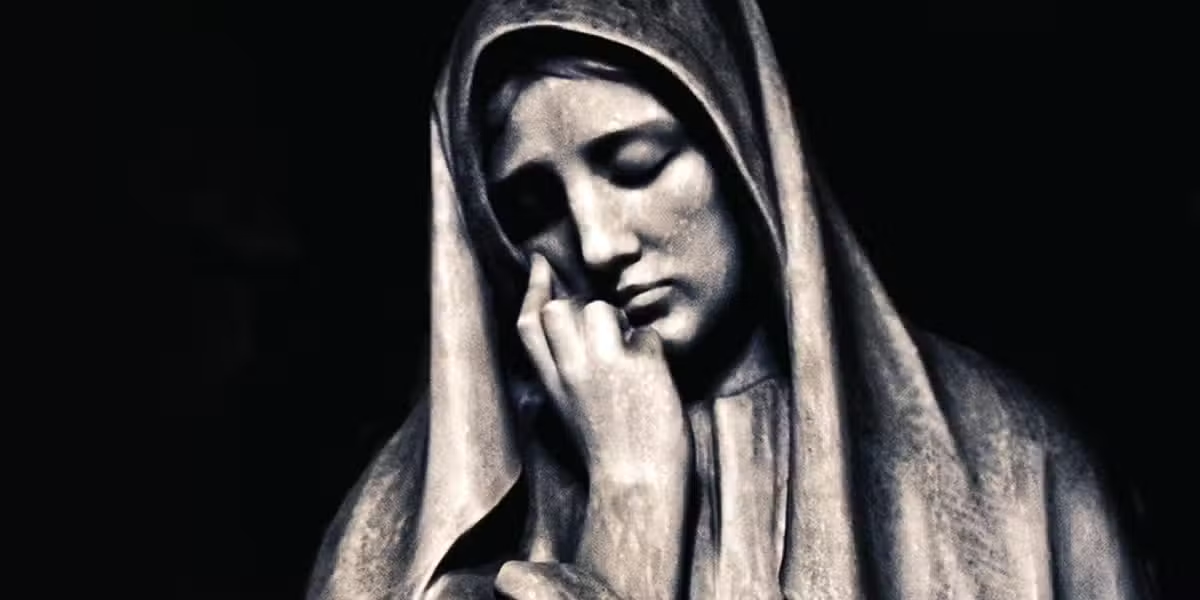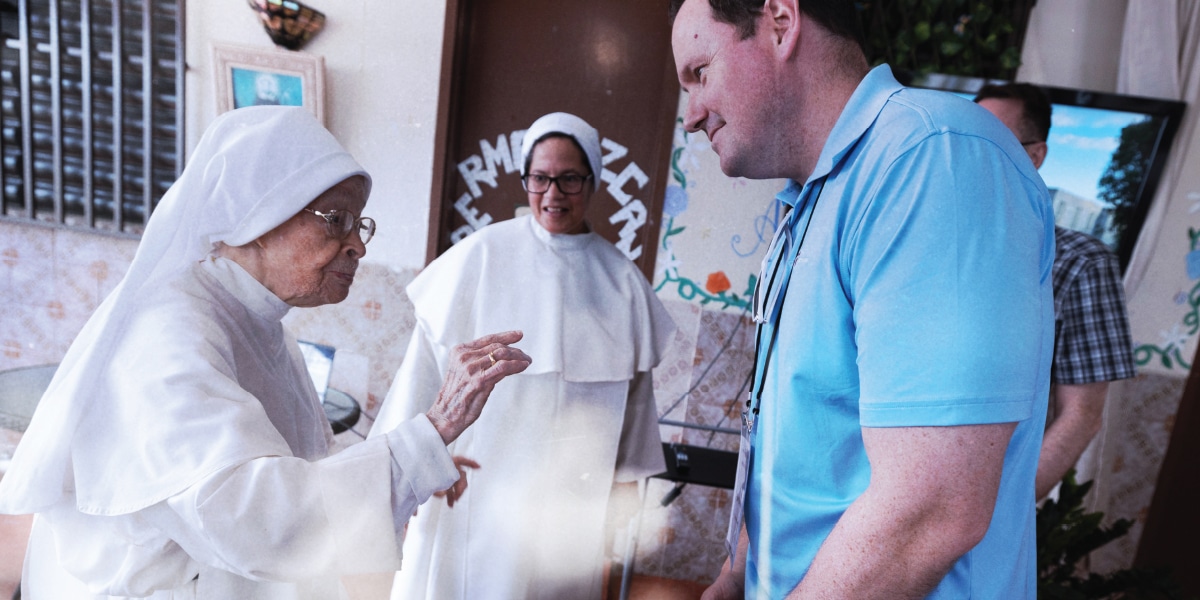Some months before I was ordained, my bishop told me he planned to send me to teach at one of our Catholic high schools. The idea terrified me. I was not popular the first time around and imagined my new experience would be much the same. My bishop ever patient with me told me to trust his decision, be myself, and share with the students my relationship with Christ.
The first and most important thing I learned was how easy it was for students to spot a phony. They had little interest in a talking head, a know-it-all, an encyclopedia (which accurately describes my first semester). I was so excited about sharing with them the beauty of the Catholic faith and having them see it the way I did that I ended up caring more about the material than I did for them.
Fortunately, a disgruntled young student had the courage to bring this to my attention. He openly challenged me to explain exactly how all this material affected my life. He did not want abstract concepts and interesting theories. His direct rebuke, “What difference does any of this make?, ” taught me a valuable lesson about the true nature of evangelization. Today this young man is an outstanding priest, author, and educator.
Since it is impossible for me to explain the difference a life of faith makes without describing how to live it, answering this young man’s question provided me with an opportunity to describe what nourished and sustained my life with Christ. It was easy for me to talk about the real impact the Trinity, the Eucharist, the Scriptures, and so on, have on my daily life, and it generated great discussions. It was easy, therefore, to challenge them to do the same. I used to say to them: “The best possible experience of life comes from following Christ. I should know, because I have the best life of anyone I know! The only way to disprove me is to follow Christ and see whether or not I’m right. ”
Everyone who has ever taken up my challenge is still following him. The question then is: How do we follow him?
It’s Not the Things You Do
The single greatest difficulty people face when following Christ is an effect of reducing one’s spiritual life to one’s religious practices. This is why many people leave the Catholic Church. They think that the pious, devotional, and obligatory things that comprise practicing the faith equate to having a life of faith. This is simply not true. The rosaries recited, the hours racked up before the Blessed Sacrament, all the Masses attended, chaplets prayed, and fasts obeyed do not necessarily indicate that one is following Jesus. Many people do these things all of them good things to do because someone told them to.
Fulfilling one’s duties and obligations, while a significant dimension of any healthy relationship, is not in and of itself the relationship. Over time, many Catholics lose interest and fall away because they do not know this. God created us for himself, not for religious practices: “The Sabbath was made for man, not man for the Sabbath ” (Mk 2:27).
Now, lest anyone accuse me of disparaging pious practices and religious obligations, hear me out. They are not and cannot be the heart of our spiritual lives. Christ has told us in his own words that he alone must be the rock foundation on which we build our lives. This can only happen if we have actually encountered him, as did the people who followed him in the Gospels. Once we have decided to leave everything to follow Christ, it becomes readily apparent that we need help in doing so. Thus, if we want to follow him, we must seek out and grab hold of those things that nourish and sustain us in doing so.
What I love about the Catholic Church is the refusal to mandate a one-size-fits-all approach to living with Christ. The Church sets before us a treasury of practices that enhance, encourage, and enliven our life with Christ. “
The organization of the Catholic Church is for just this purpose. The Scriptures preserved and handed down, the moral and social teachings that flow from them, and the sacramental life enlivened by the Holy Spirit enable us to adhere to Christ as we follow him toward our destiny with the Father. Even during his public ministry, Jesus made it abundantly clear that we do not follow him as individuals alone; we follow him as companions. I cannot, therefore, experience fully my relationship with Christ in isolation from his body, the Church. It would be something like the big toe trying to get around by itself without the rest of the foot!
One of the many things I love about the Catholic Church is the refusal to mandate a one-size-fits-all approach to living our life with Christ. The Church simply sets before us a rich treasury of practices that enhance, encourage, enliven, and even embolden our life with Christ. While many are strongly encouraged because they prove so efficacious, the Church imposes none of them upon us. We do not have to ever pray the rosary or the Chaplet of Divine Mercy, make a holy hour, pray the Divine Office, or have a devotion to Mary or a particular saint.
While we must attend Mass on Sundays and holy days, fast and abstain with the Church (according to our age and health), receive the Eucharist once a year, go to confession if we are conscious of having committed a serious sin, and financially support the mission of the Church according to our means, we are never told what to do in between. This is incumbent upon each individual believer. In other words, it is up to each one of us, and I find this refreshing.
I cannot stress this point enough. Far too many people, in trying to begin a spiritual life, merely adopt the most popular spiritual practices or disciplines. Usually they take too much upon themselves, including things that do not actually nourish them. In the end, they fail, and this leads them to think poorly of themselves. Eventually they conclude that God must also think poorly of them. This ultimately leads to resentment.
This is one reason why I am glad I am not God. He does not tell us what to do and never thinks poorly of us for trying. He does not deserve our recriminations when the plans we set for ourselves do not come to fruition. Instead of being angry at failure, we should simply try again, but this time with a plan that is reasonable and workable.
It’s Not a Means to an End
The second most common reason for failure in the spiritual life lies in treating it as a means to an end. No one should undertake a substantive life of prayer and devotion thinking it will make them holy, eradicate all suffering, or assure a comfortable, successful life. In no way is this what following Christ entails. This is just an attempt at gaming God, and it treats prayer as a form of magic. Thinking that God must do certain things for me because of what I do for God is an absolute and egregious blasphemy.
God does not bend to my will or yours; as followers of Christ, we are supposed to bend to his. God is never bound by what we do, even when done out of love for him. We should undertake the things we do for God simply because we must, period. I spend time with Jesus each day not because of how it makes me feel (sometimes I really do not feel like it) or because I promised the Church I would. I do it because I cannot live without it, and, in fact, I could not get out of bed if I did not. Perhaps there are other motivations for embracing each new day, but the only one that works for me is Jesus.
Those who undertake to follow Christ must never lose sight of the fact that the spiritual life is an end in itself. The spiritual practices I undertake as I adhere to Christ are all things that I must do. Without them, I would be unable to continue progressing with him on my journey to everlasting life. I should pray the rosary because I have found in the rhythm and pattern of the repeated prayers the space I need to reflect upon the life of the one I follow.
If, for example, I pray the Chaplet of Divine Mercy, it should flow from a desire to penetrate more deeply the sacrificial offering of Christ’s passion and death. The awareness of my need to be with the Lord should compel me to sit before him, present in the Blessed Sacrament.
The entire pattern of my life of prayer should be rooted in the recognition that I cannot live my life with Christ otherwise. If any of the things that make up my spiritual practices are done out of a hope for gaining something, then I should immediately stop doing them! Our Lady does not care how many rosaries one says or even if one does.
However, she does care about the extent to which we are evermore opening our hearts to her son. Jesus remains the focus and foundation of her eternal life; thus, she continues to serve him by encouraging us to do the same.
Jesus offers his most detailed description of judgment in Matthew 25:31â46. He does not say to those on his right: “Come, you who are blessed by my Father, for you spent 6 million hours before me, never missed a Sunday Mass, prayed 15 million rosaries, read your Bible every day, and went regularly to confession. Now enjoy the place prepared for you from the foundation of the world. ”
Jesus makes no mention of spiritual practices, devotional activities, or scriptural acumen. He does, however, make mention of the way in which those on his right not only recognized their neighbors’ needs, but also, more importantly, responded.
Of course, I would argue that it is unlikely we could be responsive in the way Jesus describes unless our lives were rooted in his. Pious and devotional practices do not make us responsive; they keep us firmly rooted in the Lord and his goodness. This in turn informs the way we see God, ourselves, others, and the world around us.
It should come as no surprise, then, that a spiritual life is not the way to get to heaven. Jesus Christ alone is the way. In order to follow him on this way, we need to be attentive to the one we are following.
The spiritual life is, to put it accurately, more a description of the way we follow than a guarantee that we are, in fact, following.
You Are Your Spiritual Life
This is perhaps the most important of all the points I want to make. What does it mean to say that one is one’s spiritual life? It means that every aspect of my life flows from and thereby expresses my relationship with Christ (or should). My spiritual life is not only the moments I am conscious of God or talking with him in personal or communal prayer. Rather, every waking moment constitutes my following of Christ.
Eating, drinking, sleeping, working, playing, thinking, resting every human activity and endeavor, no matter how grand or seemingly insignificant, should be rooted in the relationship I have with Jesus. My life with Christ had better be my life, or, essentially, I do not have a life with Christ.
This article is adapted from Prayer Everywhere: The Spiritual Life Made Simple (Servant Books), by Father Gary Caster. A priest of the Diocese of Peoria, Illinois, Father Caster has worked as a high school chaplain, religion teacher, and director of campus ministry at a number of colleges and universities.
This article is adapted from my book Prayer Everywhere: The Spiritual Life Made Simple. Click below to learn more.








